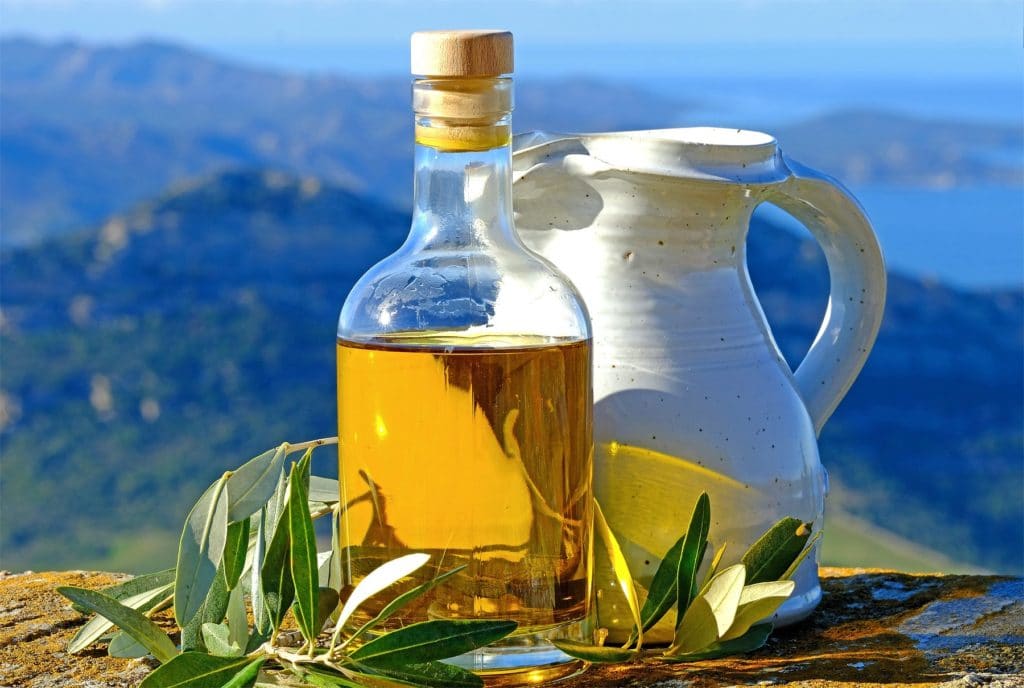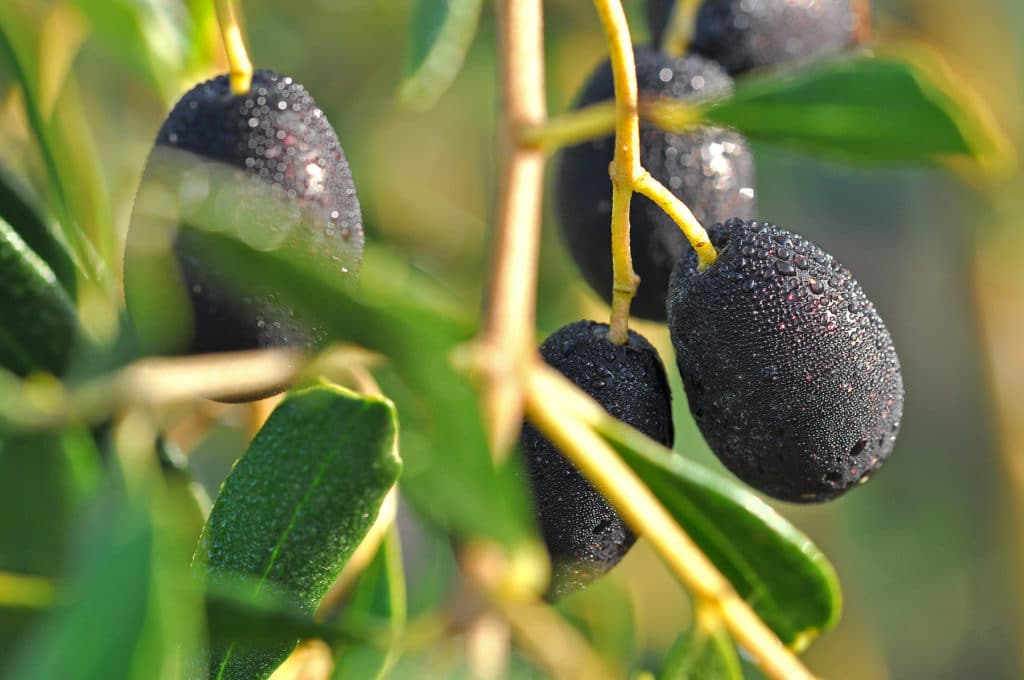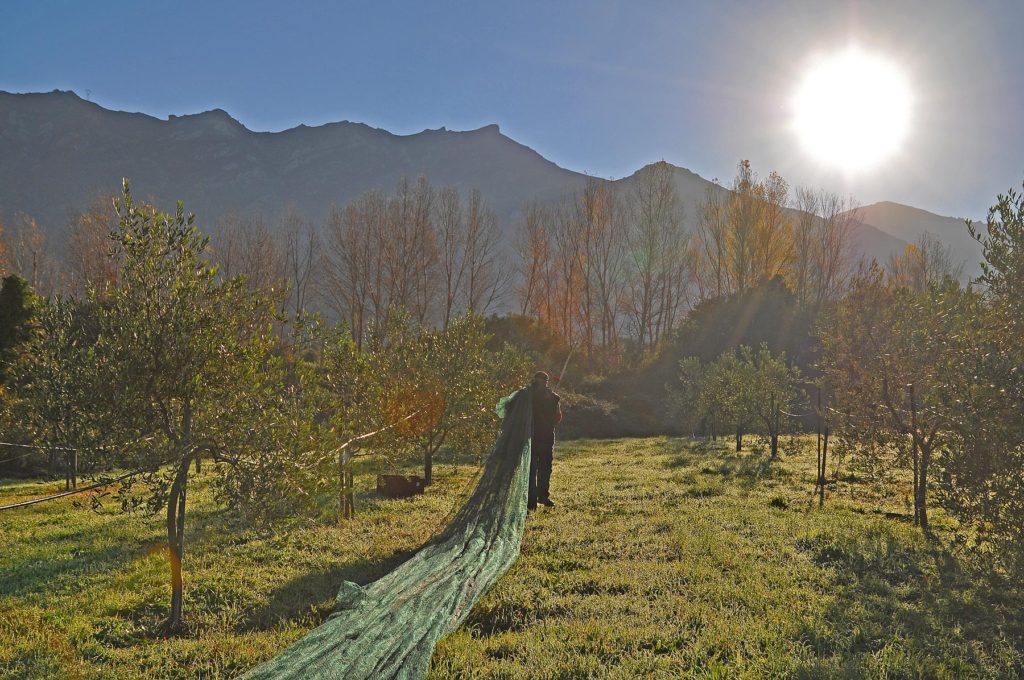
Taste authentic Corsican olive oil recognized worldwide for its unique flavours and velvety texture. Produced in accordance with ancestral traditions handed down by generations of passionate growers Corsica’s treasured liquid gold perfectly expresses the island’s identity.
This page contains affiliate links meaning I get a commission if you decide to make a purchase through my links, at no extra cost to you. Click here to learn more.

OLIU DI CORSICA
Since ancient times, olive oil has played a fundamental role in Corsican history, culture, and economy. First used as medicine, fuel, or for religious rituals (most notably against L’occiu, the Evil Eye) it soon emerged as an essential ingredient in the traditional cuisine. Deeply intertwined with the island’s fascinating history the olive tree became the most noble, almost a holy plant whereas an olive branch, a symbol of peace and friendship.
Acres of silver-leaved, twisted into natural sculptures evergreens define Corsica’s diverse landscapes. Some of the oldest specimens of the island may be found within the famous Filitosa megalithic site where excavated artifacts date back as far as the early Neolithic era. A mild climate and a unique, often frost-free environment provide excellent conditions for the cultivation and production of high-grade oil. In 2004 local growers succeeded in securing the Appellation d’Origine Protégée certification. The AOP label guarantees superior quality of the authentic product as an expression of its terroir characterized by regional climatic factors, the soil, the plant variety, and the process of production. Subject to regular checks and controls carried out by the French Accreditation Committee (COFRAC) Corsican producers assure compliance with the appellation’s rigorous specifications.
The oil is widely available in the island’s boutiques and supermarkets whereas a comprehensive list of the online stores and importers may be found at oliudicorsica.fr/ou-le-trouver-20.
BALANCED DIET
Olive oil is a staple in the healthy and diversified Mediterranean cuisine abundant in vegetables, fruit, fish, whole grains, and cheese. As the primary source of added fat, it is widely incorporated in everyday Corsican meals enhancing almost any recipe. Used in salads, stews, marinades, fried food, or even in desserts the ancient liquid continues to define the island’s culinary heritage.
HEALTH BENEFITS
According to a number of scientific studies natural polyphenols present in olive oil help to reduce the risk of cardiovascular disease, certain types of cancer (colon or breast cancer), and Alzheimer’s disease. Polyunsaturated fatty acids aid with lowering bad cholesterol and blood pressure whereas their nourishing and healing qualities prove to be beneficial for the skin.

OLIU DI CORSICA AOP – ESSENTIAL FACTS
- 2100 hectares of Corsica’s olive grove are cultivated in 297 municipalities by 300 producers (including 210 growers within the AOP).
- The orchids are present at up to 700 meters of altitude in the plains, on sloping hillsides and terraces.
- They grow mainly on poor schist and granite soils but may also be cultivated on limestone.
- Old trees measure 15-20 m whereas in modern orchids the height is confined to 3 meters.
- Each tree within the grove is allowed at least 24 m² of space with a minimum distance of 4 m between plants.
- The terrain is either cultivated or mown while irrigation is allowed during the growing season until the veraison period.
- Olive production cannot exceed 10 tons per hectare.
- Under the proper conditions, first yields are harvested 5 years after planting.
- A total delivery to a mill must comprise not more than 20% green (almost ripe) olives and at least 50% black (ripe) olives. The fruit must be processed within two days to avoid oxidation at the maximum extraction temperature of 27°C.
CORSICAN OLIVE TREE VARIETIES
- Sabina (also known as Aliva Bianca or Biancaghia), resistant and adaptable, is one of the oldest Corsican cultivars present in most regions of the island. Due to its prominent height and large canopy volume, Sabina is often harvested on nets at full maturity producing characteristic aromatic oil.
- Capannace (otherwise called Raspulada, Curtinese, or Zinzala), another old variety cultivated in southern regions of Corsica around Bonifacio, Porto-Vecchio, and Sollacaro.
- Ghjermana de Tallano (Aliva Néra), found around Sartene or Ajaccio, and Ghjermana di Casinca present in Castagniccia, Casinca, or Balagne are two varieties brought and cultivated by the Genoese during their rule in Corsica.
ENJOY A CULINARY TOUR
Taste mouthwatering Corsican specialties during an exciting culinary tour of Ajaccio, Corsica’s capital city. A local guide will introduce you to artisanal products and dishes away from the tourist traps. Tastings last for up to 3 hours and vegetarians are welcome. Learn more about this gourmet adventure and book your tour here.

OLIVE HARVEST
In Corsican groves, the harvest takes place between October and February, when ripe olives start to exude characteristic cloudy juice when squeezed. There are two methods of collecting fruit employed depending on the accessibility of the site and the size of the trees.
‘Récolte à l’ancienne’, the traditional harvesting technique allows for a natural fall of mature black olives into nets stretched under the trees. Oil produced from traditionally gathered fruit offers a full body and round, mild flavours of dry hay, dried fruit, maquis, and mushroom.
‘Récolte sur l’arbre’, the harvest from the tree, often with the use of electric rakes to shake off the fruit, produces a more intense oil with high levels of bitterness and spicy aromas balanced by almond, artichoke, and apple flavours.
Harvested olives loaded into plastic crates are then transferred to the mill for processing. The extraction process starts with a thorough cleaning of the fruit to wash off any dirt and remove leaves, stems, and twigs. In the next step, olives are crushed into a paste and mixed for a short period of time to facilitate the release of oil droplets. The final stage of the purification process is performed by a centrifuge that separates the oil from solids water. Left in tanks or barrels for several weeks the settled oil is then filtered, bottled, and labeled, ready for consumption.
HELPFUL TRAVEL RESOURCES :
Please help support CoolCorsica!
If you find this website as useful as a guidebook you may have had to buy to plan your adventures, please consider helping me with a small donation.
This all-content traveler-focused site is created in my spare time with a desire to share comprehensive information, useful tips, and inspiring photos of Corsica’s most scenic locations.
Please note that certain products/services and links to products/services are affiliate links and I may earn a commission for any purchases that you make, at no additional cost to you. I truly appreciate your use of any of the links I share.
With your generous help, I can continue to offer my advice and support in planning your dream holiday.
Thank you for your contribution!

2 comments
Where can I buy Corsican olive oil
Hello,
The most comprehensive list of places where Corsican olive oil may be purchased can be found on the official site of local producers https://www.oliudicorsica.fr/ou-le-trouver_20.
Have a lovely tasting!
Karola